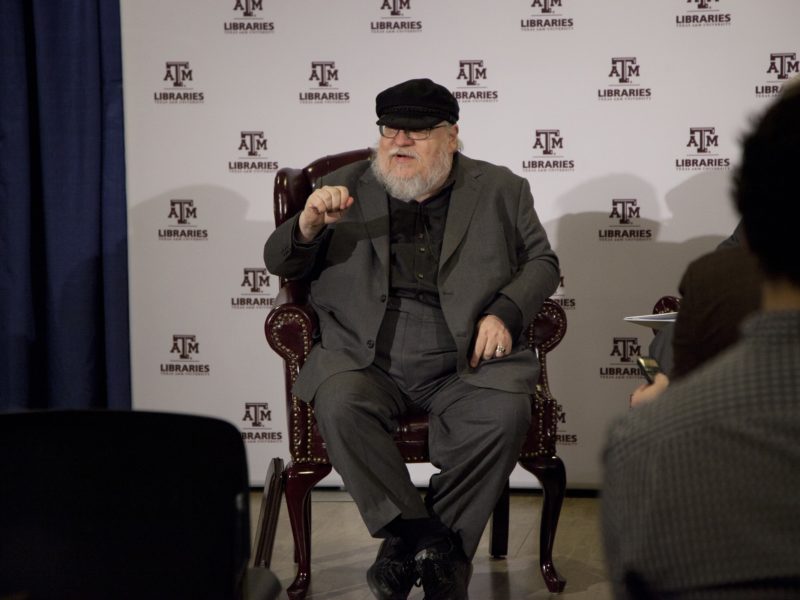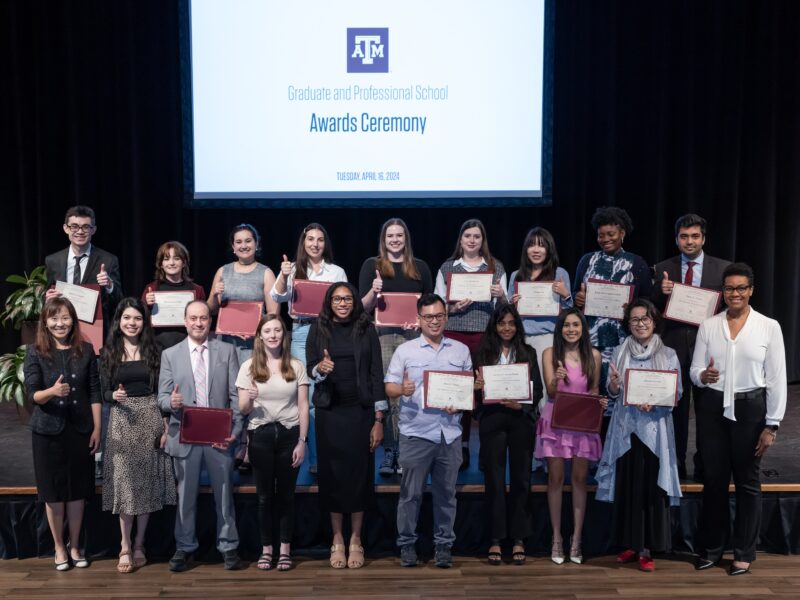Author George R.R. Martin Visiting Campus, Talks ‘Game Of Thrones’ And Texas A&M Libraries

Sci-fi/fantasy author George R.R. Martin, known for his book series “A Song of Ice and Fire,” the basis of the HBO series “Game of Thrones,” is visiting Texas A&M University today. In 1993, he chose Texas A&M’s Cushing Memorial Library and Archives to be the official repository for his manuscripts, books and associated memorabilia. This collection is the basis of Cushing’s new exhibit titled Deeper Than Swords. To celebrate the opening of the exhibit, Martin is visiting Texas A&M, and surrounding events include a lecture and Q&A along with an advanced screening of the season premiere of “Game of Thrones” which will air on HBO on March 31. Texas A&M Today caught up with Martin to chat about writing, fans, turtle knights and more.
Why did you choose Texas A&M to house your collection?
In the 1970s I would come to Texas to visit friends and I would come to AggieCon [the student-run sci-fi/fantasy convention]. During the course of one AggieCon, I got a tour of the science-fiction and fantasy collection at the library and I was very impressed with not only the collection itself, but the physical facilities they had for protecting the papers, books and other collectibles. It is very well taken care of and has a good archival system. Later when I was drowning in papers here, I thought of putting it all on deposit in a library somewhere. I remembered Texas A&M and the great facilities you have there.
What is the origin of the double “R” in your name?
I was born with one ‘R,’ that was my father’s name, Raymond. I was raised Catholic and at the age of 13, I took a confirmation name, the name of my cousin which happened to be another ‘R.’ And it was around the same time I started writing and publishing stories in comic book fanzines and I started using the double ‘R.’ It was lucky that I did because George Martin is a very common name. So the R.R. has made my name memorable and that’s important for a writer because it’s your brand name, your trademark.
Do you remember the first story you ever wrote as a kid?
The first stories I remember writing were stories about my pet turtles. We lived in housing projects in New Jersey and we weren’t allowed to have cats or dogs. The only pets I could have were dime-store turtles and I kept them in a toy castle. Since they lived in a castle, they were all knights and kings and lords, and I started writing stories about their adventures.
In the mid-to-late ’80s, you wrote for television shows such as “The Twilight Zone” revamp and “Beauty and the Beast.” How did you feel when you first saw people playing the characters from your imagination?
My first experience with that was on “The Twilight Zone.” The first script of mine to go into production was an adaptation of Roger Zelazny’s classic short story “The Last Defender of Camelot.” When they started actually building Stonehenge on the stage behind my office, it was pretty amazing. I’d been a professional writer for 16 years, but strictly in prose. To suddenly see teams of carpenters, painters and set designers making tangible reality of something that had just been a dream in my mind and Roger’s mind before that, was really an experience.
How is novel-writing different from writing for television?
Television is a different medium and it takes certain skills: I have a very strong sense of structure and you have to have a good ear for dialogue. The limits imposed on you are stricter. I can write a novel and sprawl out to 1,500 pages. But a teleplay is maybe 50 pages, so it’s a matter of discipline. Also, television is a more collaborative medium. With books, the author is everything: I’m the writer, the director, special effects producer, costume and set designer. When you’re doing television, you’re depending on a lot of other people to add their talents to your own.
How pleased are you with the way “Game of Thrones” appears on screen?
I’m delighted, it’s fantastic. I don’t know if I was very lucky or very smart to put myself in the hands of David Benioff and D.B. Weiss*, the showrunners, who’ve done an incredible job. Our cast is amazing, we have great directors, the look of the show – the costumes, the special effects, the set designs – are all incredible.
Is it difficult to hand over control of the story to other people?
It’s true that they can take the story in any direction they want. Before I signed with them, we had a long meeting where we discussed that and I was convinced from what they said that they wanted to do my story. But legally, there’s nothing to constrain them. They could move it all to the 20th century and introduce robots if they wanted, but they’re not going to do that.
When Ned Stark was killed, you let the audience know for the first time that even main characters aren’t safe in Westeros. Why did you choose this path and what kind of an effect does it have on the audience?
I was a reader long before I was a writer. I still read voraciously and the thing that I’m most impatient with is predictability. You know who the villain is and who the hero is and it’s just going through the motions. I think the best fiction is ‘immersive fiction,’ where after you read it you felt as if you’ve lived it. Part of that is not knowing what’s going to happen when you turn the page. If you know the hero is safe, the suspense is gone. I want the reader to think ‘Oh my God, what’s going to happen to my favorite character? Dare I turn the page?’ And to do that you have to establish very early on that you’re playing for keeps. That was part of what happened to Ned, but there were also story reasons for that. Much of the story is about his kids, so you have to move the father figure out of the way so the kids can create their own destinies.
Are there parallels between modern politics/warfare and that of Medieval times? Have we advanced at all?
I’m not writing an allegory; there is no one in the story that’s a contemporary politician with a name-change. But certain things are eternal: power struggles, what the role of a king or a government should be, how to protect your people and what innate rights people have. All of these issues are timeless. We have made progress – we don’t have beheadings in the town square anymore. But I have a feeling that if we did beheadings on television, they would get very good ratings. There’s still an appetite for that, just like in Medieval times.
What is your favorite line you’ve ever written?
I certainly like ‘Stick ’em with the pointy end.’ And it’s more than one line, but I like the ‘Oath of the Night’s Watch.’ I revised it a number of times, polished it to get it exactly how I wanted it and to this day, it still gives me goosebumps when I hear it.
How do good reviews affect you?
They please me, of course, and I’ve had ones displease me. I’ve occasionally learned something from a bad review. There are bad reviews that are insightful and they make a point about your weaknesses as a writer or some mistake you’ve made and hopefully you don’t make it again or you try to correct that weakness. But there’s no doubt that like all writers I immensely prefer good reviews to bad reviews. And indeed like all writers, I’m massively insecure, so if I read a hundred good reviews and one bad review, that bad review will stick in my craw and I think ‘How can he say that? Stupid guy!’
You’re known as one of the more accessible authors. Why do you make yourself so available to your fans?
I wrote my first story in ’71 and went to my first convention that same year. At conventions I get to meet the fans face-to-face; I’ve always enjoyed that. I think it’s one of the great things that science fiction and fantasy has that other genres don’t. I often do readings at conventions and I like to see – do they laugh at the jokes, do they react when an unexpected twist comes? I like to feel the audience reaction.
How’s that sixth book coming? Any predictions as to when you’ll finish?
Well, I’m working on it. No predictions yet.
Which homage was cooler: the Simpsons recreating the Game of Thrones title sequence or Mr. Garrison teaching about it to the South Park kids?
They were both pretty cool, I couldn’t pick one or the other. I also loved ‘Big Bang Theory‘ when Sheldon and Leonard bought Jon Snow’s sword and it’s still visible in their apartment; it’s hanging right by the door. Seeing the show referenced in all these other shows is a sign of what degree we’ve become part of the popular culture and that’s exciting!
The George R.R. Martin exhibit at Cushing Library runs today through December and is open to the public. All events surrounding Martin’s campus visit are sold out, but he will appear at AggieCon which will take place at the College Station Hilton Hotel March 22-24. For tickets and more information about AggieCon, visit the Cepheid Variable website.
Martin’s campus visit is hosted by Cushing Memorial Library and Archives, which joins MSC Aggie Cinema and HBO in hosting the screening.
* This link is no longer active and has been removed.




